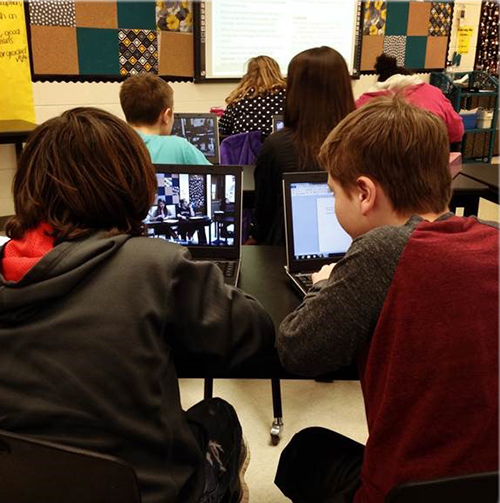An innovative exercise asking seventh-grade students to evaluate their performance using the basic tools of discourse analysis yielded heightened self-awareness and a greater appreciation for the power of discussion, according to a paper published in Voices from the Middle, a journal of The National Council of Teachers of English, in May.
"Motivating Dialogue: When Seventh Graders Own their Learning through Discourse Analysis" was a collaborative effort between educators representing different aspects of the Master of Arts in Teaching program at the University of Arkansas – an M.A.T. intern, her mentor in the public school classroom, and an associate professor of English education.
Jennifer Dean, lead author and now an eighth-grade English teacher in Leander, Texas, designed the project as part of her master's thesis on the use of student-centered dialogic tools in the classroom. She worked with Tara Nutt, then a seventh-grade English teacher at Lincoln Junior High in Bentonville and also an M.A.T. graduate, and Christian Goering, associate professor of English education and director of the Northwest Arkansas Writing Project. A podcast by Dean about the experience is also available for listening online.
The activity built on skills the students had been developing all semester, Dean said. She had introduced student-driven Socratic circles as part of her teaching strategy, engaging young people in group discussion and then asking them to reflect on their learning process.
The exercise in discourse analysis required students to apply those skills to a task typically reserved for graduate students and professors, Dean said. She and Nutt filmed a Socratic circle discussion about the book Children of the Great Depression by Russell Freedman and asked students to analyze it the following day.
Initial horror at watching themselves onscreen was transformed into curiosity as students worked in teams of two to view and transcribe two-minute segments of the 45-minute discussion, Dean said. The teams coded their data with simple quantitative information, such as how many students participated in the segment and how many times they asked questions, and wrote reflection papers on what they had learned.
"It really allowed them to dig into what it was like to have a meaningful discussion about literature – and whether they were having a meaningful discussion or not," Dean said. "In their papers, they reflected on everything from saying 'like' too many times to missing out on unheard voices. They were really seeing the intricacies of discussion and what makes it beneficial."
The activity underscored the importance of student-led discussion for classroom learning, Dean said. Research shows that such an approach improves comprehension, cultural competency and academic performance. "When students are able to talk to each other, to make connections to their own lives through literature, that's how they begin to make meaning."
The project also helped students recognize the power of their own voices for both written and verbal communication. They saw that their peers have different strengths – a student strong in writing might not do as well in discussion and vice versa. A highlight was when one student, a reluctant speaker at the start of the school year, decided she wanted to join the conversation.
The experiment with discourse analysis showed what seventh-grade students are capable of, Dean said.
"I hear so frequently, 'Middle school students can't do that. Middle school students aren't really capable of higher level thinking and comprehension.' I think activities like this prove that that's incorrect. When we give them things to do that are clear and are relevant and have a purpose, then they are engaged, and they are excited and they are ready to learn."
Contacts
Bettina M. Lehovec, staff writer
University Relations
479-575-7422, blehovec@uark.edu
Heidi Wells, director of communications
College of Education and Health Professions
479-575-3138, heidisw@uark.edu
